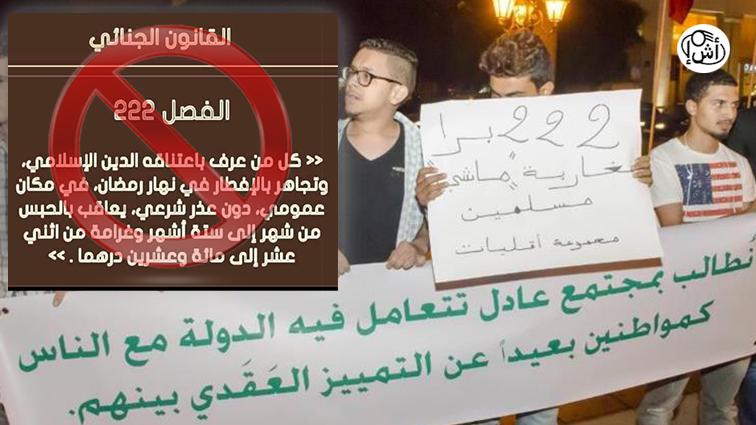A massive online campaign has begun in Morocco to repeal a legal chapter that criminalizes eating and drinking publicly in Ramadan and punishable by imprisonment.
Article 222 of Morocco’s penal code stipulates that “anyone who is known to have converted to Islam and who breaks the fast during the day Ramadan in a public place, without a legitimate excuse, shall be punished by imprisonment from one to six months and a fine of two hundred dirhams.”
A few days before the beginning of Ramadan, the debate on the freedom of fasting returned, as human rights voices escalated calling on the authorities to repeal this law and protect the freedoms of their members, and for this purpose an electronic campaign was launched under the title “Eating is not a crime”, and an initiative was put forward to Parliament to convince it of the futility of this law.
The Deleuze Institute for Policy Analysis launched the “Eat is a Crime” movement, which justified its calls for the repeal of the law by its negative effects on the national economy by closing entertainment spaces, and by physically and verbally persecuting those who break the fast under the cover of the law.
The Institute confirmed that no political party has yet officially responded to its invitation, although it has written to political party leaders.
The discussion moved to social media, where activists’ opinions were divided between those who called for more individual freedoms by reconsidering the article, either by amending or canceling it, and those who believed that breaking the fast in a Ramadan month was a provocation to the feelings of Muslims and fasting people and transgressed and encroached on the customs, traditions, and religion of the country.
Activist Walid al-Najmi believes that the law criminalizing breaking the fast in Ramadan is one of the most ridiculous laws, stressing that it is unreasonable to punish a person living in a modern state in order to eat in Ramadan, adding that there is no religious text that urges the imprisonment of non-fasting people and that fasting is an individual freedom that has nothing to do with the state.
For his part, activist Ezzedine Serifi said: “Are we done with all the economic, social and political problems and left with nothing left for us except the point of breaking the fast in public Ramadan?” He pointed out that such a debate confirms that some live on the margins of the Moroccan people and contribute to the return of political Islam organizations to the forefront and even contribute to the revival of even extremist ideology.
"الماكلة ماشي جريمة".. حملة بالمغرب لإلغاء "الفصل 222" مع اقتراب رمضانhttps://t.co/OLaBPe0j6E
— أصوات مغاربية (@maghrebvoices) February 28, 2024
